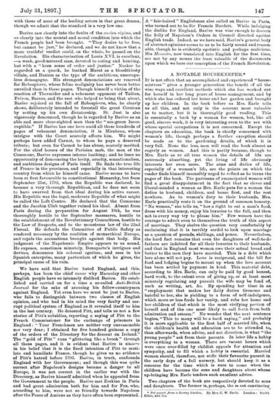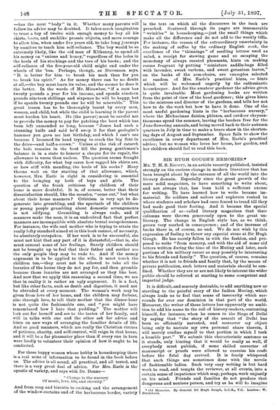A NOTABLE HOUSEKEEPER.*
IT is not often that an accomplished and experienced " house- mistress " gives a younger generation the benefit of all the wise ways and excellent methods which she has worked out for herself in her long years of house management, and by which she has ordered her home and her garden and brought up her children. In the book before us Mrs. Earle tells us all this, and not only is the account most valuable as to matter, but it is thoroughly good reading. This is essentially a book by a woman for women, but, like all good, sincere work, it is very interesting even to the sex with whose special occupations it is not concerned. Except the chapters on education, the book is chiefly concerned with women's life, though perhaps a further exception should be made as to the gardening details, of which it is very full. None the less, men will read the book almost as eagerly as women. And this is partly because, though to Mrs. Earle as to all true women the details of life are extremely absorbing, yet the living of life obviously interests her even more. The aims and duties of life, especially of a woman's life, are the points on which the reader finds himself insensibly urged to reflect as he turns the pages of the book. The partisans of emancipated women will find a great disappointment in the fact that so clever and liberal-minded a woman as Mrs. Earle puts for a woman the duties to husband, children, and home first, and the rest nowhere. As to women's duty to their husbands, Mrs. Earle practically rests it on the ground of common honesty. "No woman," she tells us, "has a right to eat a man's food, dress with his money, enjoy his luxuries to the full, and then not in every way try to please him." Few women have the courage to admit even to themselves the truth of this aspect of marriage. They shelve the question very comfortably by exclaiming that it is terribly sordid to look upon marriage as a question of pounds, shillings, and pence. Nevertheless, the hard fact remains that even the daughters of well-to-do fathers are indebted for all their luxuries to their husbands, and that in England most women owe their actual bread and butter to the men they have married. This is a debt which love alone will not pay. Love is reciprocal, and the bill for food and lodging begins to mount up when the love account has been settled by payment in kind. This material debt, according to Mrs. Earle, can only be paid by good honest, hard work, to the extent even of giving up, or at least most minutely regulating any pursuit the wife may be fond of, such as writing, art, &c. By spending her time in an "employment that makes her daily duties tiresome and hateful to her, she is yielding to a form of self-indulgence, which more or less feeds her vanity, and robs her home and her children of that which is the most vivifying portion of herself and of the one most likely to call forth from both admiration and esteem." No wonder that the next sentence begins, "This to many will be a hard saying," and probably it is more applicable to the first half of married life, when the children's health and education are to be attended to, than afterwards, when advice, and not direction, is what "the young people" ask from their parents. In later life a hobby is everything to a woman. There are vacant hours which were once over-filled by childish appeals for attention and sympathy, and to fill which a hobby is essential. Married women should, therefore, not stifle their favourite pursuit in the early days of a bill nursery, but should keep it as a resource for the time which is sure to come when the children have become the sons and daughters about whose up-bringing Mrs. Earle tenders such excellent advice.
Two chapters of the book are respectively devoted to sons and daughters. The former is, perhaps, the m ost convincing,
• Pot yourri from a Surrey Garden. By Mrs. 0. W. Earle. London Smith Elder, and Co.
—has the most " body " in it. Whether many parents will follow its advice may be doubted. It takes much imagination to trust a boy of twelve with enough money to buy all his shirts, boots, and suchlike prosaic objects, and more courage to allow him, when under five years old, to take long journeys by omnibus to teach him self-reliance. The boy would be so extremely likely, like the old man of Kilkenny, to spend all his money on "onions and honey," regardless of the holes in the heels of his stockings and the toes of his boots ; and the self-reliance of the five-year-old child might end under the wheels of the 'bus. Perhaps, though, as Stevenson says, "It is better for him to break his neck than for you to break his spirit." As for money there can be no doubt at all,—the boy must learn its value, and the sooner he does it the better. In the words of Mr. Micawber, "if a man has twenty pounds a year for his income, and spends nineteen pounds nineteen shillings and sixpence he will be happy, but if he spends twenty pounds one he will be miserable." This great lesson has to be thoroughly learnt by every man, woman, and child, but while the child is learning it the parent must harden his heart. He (the parent) must be careful not to provide the money to pay for patching the boot which has been left unmended so long, because " Jones had such a stunning knife and said he'd swop it for that geologist's hammer you gave me last birthday, and which I can't use because I loosened its head trying to crack the big flint in the drive—and half-a-crown." Unless at the risk of catarrh the hole remains in the boot till the young gentleman's balance is in a state to honour a cheque for its repair, the allowance is worse than useless. The question seems fraught with difficulty, for what boy cares how ragged his shirts are, or how stiff with mending, the heels of his socks ? Many thorns wait on the starting of that allowance, which, however, Mrs. Earle is right in considering is essential to the bringing up both of boys and girls. The question of the frank criticism by children of their home is more doubtful. It is, of course, better that their dissatisfaction should, like the measles, "come out," but what about their home manners ? Criticism is very apt to de- generate into grumbling, and the spectacle of the children or young people grumbling about domestic arrangements is not edifying. Grumbling is always rude, and if manners make the man, it is an undoubted fact that perfect manners are incompatible with absolute brutal outspokenness. For instance, the wife and mother who is trying to attain the really lofty standard aimed at in this book cannot, of necessity, be absolutely outspoken. If her work is to be successful, she must not hint that any part of it is distasteful,—that is, she must conceal some of her feelings. Surely children should not be brought up to feel that their father and mother are the only people they may be rude to. And if the money argument is to be applied to the wife, it must touch the children too,—they must not be allowed to take all the luxuries of the house they do not pay for, and then grumble because those luxuries are not arranged as they like best. And now that we apply this reasoning a second time, we see that in reality it is rather an ugly argument. It is a fact, but like other facts, such as death and digestion, it need not be obtruded at every moment. The woman's work may be given from love of her home, and the children may forbear, also through love, to tell their mother that the dinner-hour is not quite the fashionable one, and "you might have remembered how I hate that pudding." The mother will look out for herself and see to the tastes of her family, and will in talks with one and the other ask for advice and hints on new ways of arranging the familiar details of life. And so good manners, which are really the Christian virtues of patience, charity, and self-control, will reign in that house, and it will be a far pleasanter place than if every one in turn were loudly to volunteer their opinion of how it ought to be conducted.
For those happy women whose hobby is housekeeping there is a real mine of information to be found in the book before us. The advice is all sound, all practical, and all tested, and there is a very great deal of advice. For Mrs. Earle is the apostle of variety, and says with Dr. Donne- " Change is the nursery Of music, love, life, and eternity."
And from soap and biscuits to cooking and the arrangement of the window-curtains and of the herbaceous border, variety
is the text on which all the discourses in the book are preached. Scattered through its pages are innumerable " wrinkles " in housekeeping,—just the small things which make all the difference and do not add to the weekly bills. For instance, the reason of the extraordinary unoertainty in the making of coffee by the ordinary English cook, the excellence of the " thinnings " of seedling lettuce used as salad, a receipt for stewing game and so escaping the monotony of always roasted pheasants, hints on making rooms fragrant by putting " miniature saddle-bags filled with lavender, sweet verbena, and sweet geranium leaves," on the backs of the arm-chairs, are examples selected at random of Mrs. Earle's practical hints, — hints which will be welcomed eagerly by the enthusiastic housekeeper. And for the amateur gardener the advice given is quite invaluable. Most gardening books are written from the point of view of the head gardener ; this gives hints to the mistress and director of the gardens, and tells her not how to do the work but how to have it done. One of the most useful gardening hints is the "herbaceous nursery," where the Michaelmas daisies, phloxes, and outdoor chrysan- themums spend the summer, leaving the borders free for the June flowering annuals, and being moved back to their autumn quarters in July in time to make a brave show in the shorten- ing days of August and September. Space fails to show the excellence in every department of Mrs. Earle's practical advice; but no woman who loves her house, her garden, and her children should fail to read this book.







































 Previous page
Previous page